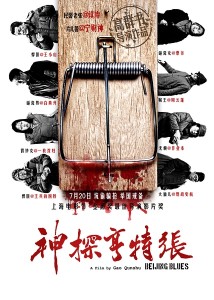Beijing Blues
神探亨特张
China, 2012, colour/b&w, 2.35:1, 115 mins.
Director: Gao Qunshu 高群书.
Rating: 8/10.
Exhilarating, docu-drama-like ride with a squad of Beijing plainclothes crime-hunters.
Haidian district, northwest Beijing, the present day. Zhang Huiling (Zhang Lixian) is a veteran plainclothes detective leading a team from the local police station specialising in catching pickpockets and fraudsters. In seven years Zhang has arrested over 1,600 criminals on the streets. One of his techniques is to use a minicam to record evidence as he follows suspects. One day, after arresting a thief stealing money from a car, he becomes suspicious of the car’s owner, Li Wuyi, and follows him, exposing a scam in which children are used to extract money in fake car accidents. While doing so, Zhang hears that a famous thief, Golddigger Zhang (Zhou Yunpeng) has arrived in town. Among other cases, Zhang Huiling tracks down a husband-and-wife team running a scam of exchanging fake 100-yuan notes for small change. One night, he becomes involved in the case of of a young child, Xiao Ya’er, who’s repeatedly run over in an alleyway. Golddigger Zhang then texts Zhang Huiling and says he plans to steal RMB100,000 during the next three days and will donate the money to Xiao Ya’er. Zhang sets out to hunt him down in a battle of wits.
REVIEW
After the period WW2 spy movie The Message 风声 (2009) and splashy Eastern Wind Blast 西风烈 (2010), director Gao Qunshu 高群书 returns to the more realist-based mode of his earlier police drama, Old Fish 千钧。一发 (2008), but with added physical punch in Beijing Blues 神探亨特张. Instead of wintry, ramshackle Harbin, the action this time unfolds on the streets of wintry, modern Beijing – specifically Haidian district, northwest of the city centre, known for its universities and IT companies – photographed in hard, cold light by ace d.p. Wu Di 邬迪, known for his films with younger directors like Wang Xiaoshuai 王小帅 (In Love We Trust 左右, 2007; Chongqing Blues 日照重庆, 2010).
Beijing to its fingertips, not least in its dry humour and gruff but inwardly warm inhabitants, Blues (whose Chinese title means “Detective Hunter Zhang”) is very different from the visually sweeping Wind Blast and The Message, and even Gao’s debut feature, war-crimes drama Tokyo Trial 东京审判 (2006). But with its growly humour, over-excitable characters and sense of perpetual movement it’s an exhilarating, involving ride for most of its running time.
With only the slimmest of over-arching plots – a renowned thief has arrived in town – the movie is essentially a series of cases knitted together, with song interludes over montages of everyday street life. (The tone of these songs is somewhat at variance with the film’s rough-and-ready style, but overall they do contribute an emotional pull.) The cases are extremely varied and differ widely in screen time – some an excuse for stand-up comedy by a known personality, others a street chase, and still others requiring actual investigation – but the common factor is the well-developed street nose of its protagonist, Zhang Huiling, who can smell a crime, however petty, even before it’s been committed.
Apart from his intuition, Zhang’s other aids include CCTV, his personal mini-cam, and the pedestrian bridges which span the city’s broad thoroughfares. Via Wu’s hand-held, documentary-like shooting, the viewer is a constant companion to the asthmatic, diabetic cop, whose life seems to be conducted almost entirely on the streets and back alleys of Haidian. His home life with his wife is shown only briefly.
Gao’s twist to the casting is to use not well-known stars but largely popular micro-bloggers on Sina Weibo (China’s hugely popular equivalent of Twitter, with 300 million users), which adds a further everyday dimension to a film that stresses policing as a community activity, for the common good, not something remote and authoritarian. Performances are natural in a slightly exaggerated way, led by Zhang Lixian 张立宪, 42, a onetime journalist turned microblogger and publisher, whose eagle eyes in a hangdog face make the unsmiling plainclothes cop into almost an animal of prey scanning the streets for his next victims. Other names, like scriptwriter Ning Caishen 宁财神 (My Own Swordsman 武林外传, 2011; Color Me Love 爱出色, 2010) as a fellow cop, pop up in the large supporting cast.
With its moto perpetuo style – relieved only by the song interludes – the movie takes considerable concentration to follow events and piece together some of the scams, and the rough Beijing dialogue is a challenge for any subtitler. At the halfway point, Gao springs a kind of Brechtian trick with a Beijing TV film crew that further keeps the audience on its toes. Overall, the film doesn’t quite justify its almost two hours length, and loses some traction about two-thirds of the way through. It’s not China’s first cop movie to have a street feel; but overall, Hebei-born Gao has certainly raised the stylistic bar with this tough love letter to his adopted city.
CREDITS
Presented by Beijing Yuanxin International Culture & Media (CN), Beijing Mengjiangwei Film & Media (CN), Shanghai Yinrun Media & Advertising (CN), Enlight Pictures (CN). Produced by Enlight Pictures (CN).
Script: Dai Yan, Gao Qunshu. Photography: Wu Di. Editing: Yang Hongyu. Art direction: Xiao Yifan. Styling: Liu Hongman. Costumes: Liu Hong. Sound: Long Xiaozhu. Executive direction: Ming Andi.
Cast: Zhang Lixian (Zhang Huiling), Zuo Yeben (man following Zhang), Zhou Yunpeng (Golddigger Zhang), Wang Xiaoshan (Wang Xiaofeng, thief), Ning Caishen (policeman), Gu Xiaobai (fraudster), Zhao Mingyi (driver), Xu Wen (Zhang’s wife), Wang Bin, Piao Ye, Shi Hang, Kong Ergou, Yimei Fafu, Bai Yansheng, Zhang Facai, Chen Xiaoqing, Quan Yongxian, Zhang Xiaoqiang, Mou Sen, Zhang Axin, Qi Xi, Zhang Yezi, Shu Kewen, Murong Xuecun, Zhang Enchao.
Premiere: Shanghai Film Festival (Competition), 21 Jun 2012.
Release: China, 20 Jul 2012.
(Review originally published on Film Business Asia, 25 Jun 2012.)
